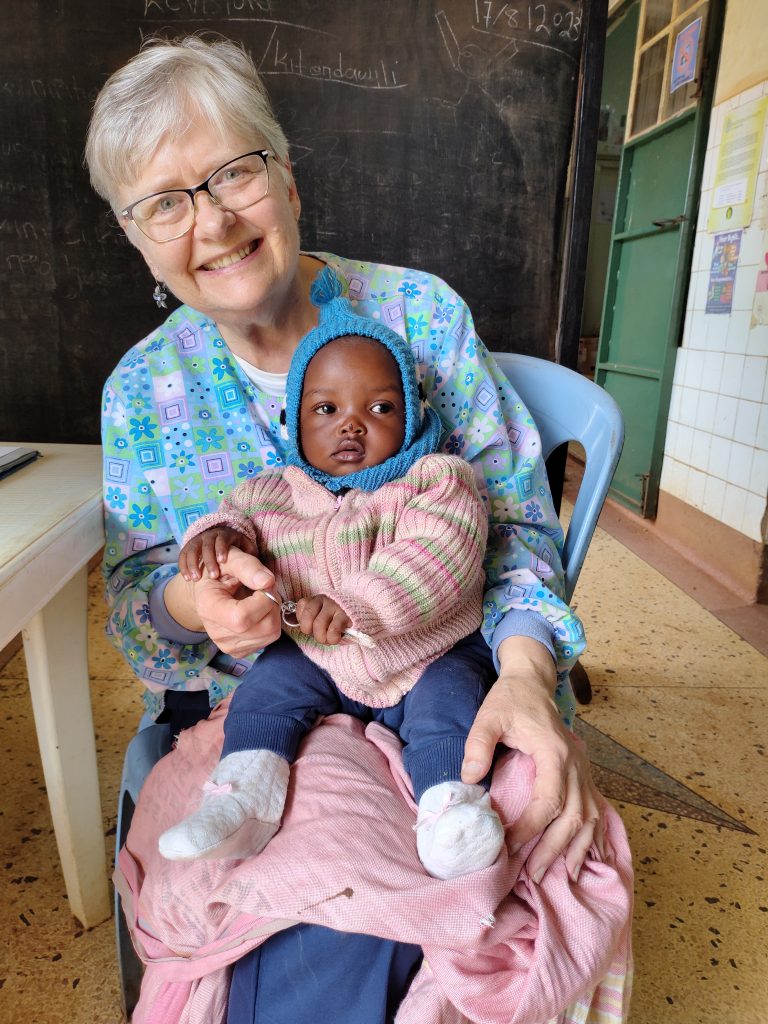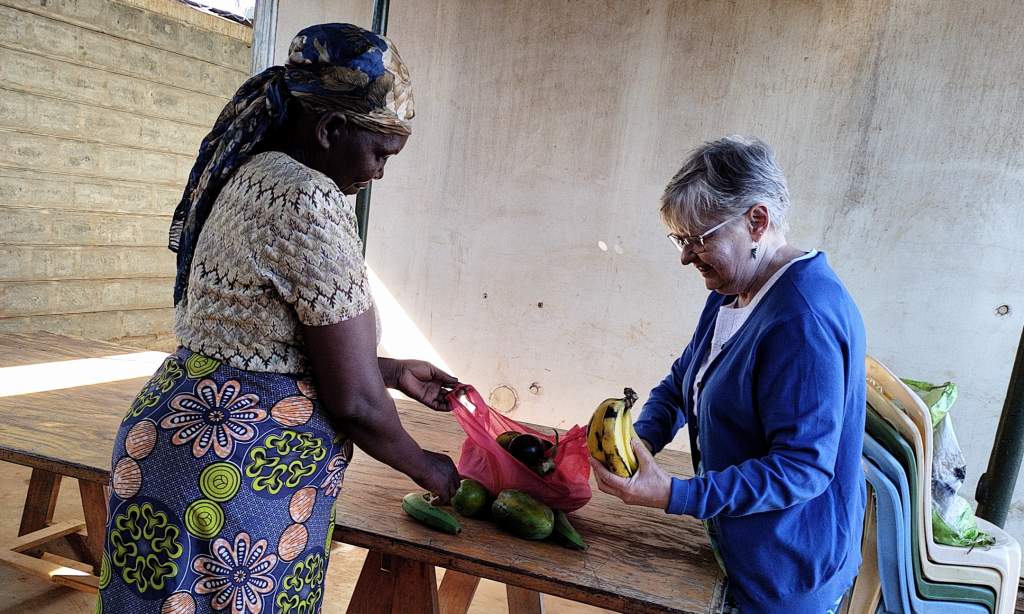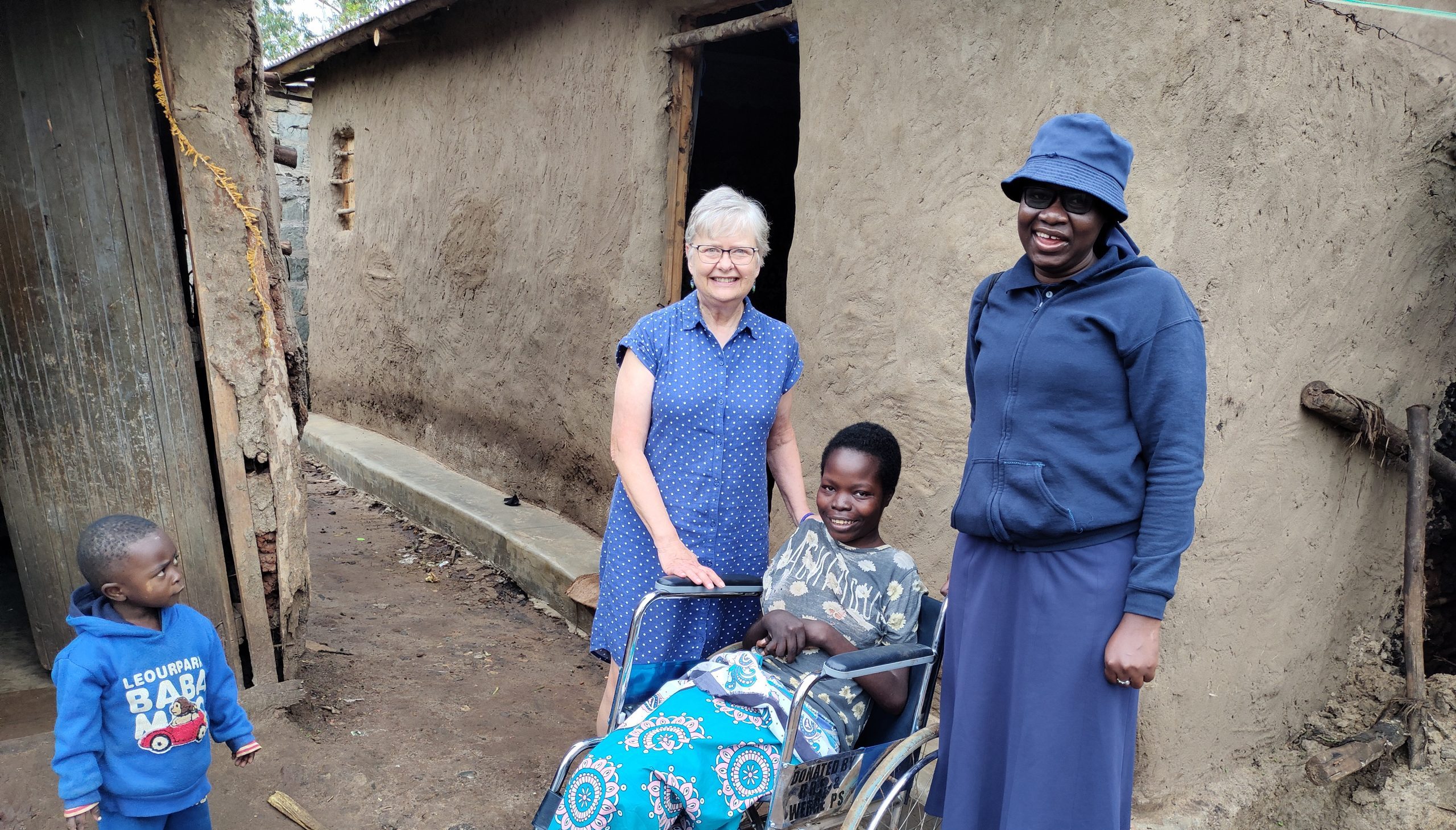Seeing the stranger in the poor
Being raised by devout Catholic parents and having a brother who is a Salesian brother, I have grown up with a sense of mission. My Catholic upbringing had nurtured a sense of service in my life that I found difficult to ignore. In my 20s, I volunteered at a Catholic mission school in South Dakota and later was a volunteer with hospice, the physically disabled and the Red Cross.
The Eucharist calls us to serve, and I was blessed to have the desire and the opportunities to serve overseas. As a registered nurse, I participated in short mission trips to Haiti, Tanzania and Ethiopia. Each of these experiences changed me and strengthened my relationship with God. The poverty I witnessed made me realize that the blessings in my life were immeasurable!
The Daughters of Charity and a Calling
After retiring, I felt a strong desire to engage in long-term mission service. In 2017, I became a Maryknoll Lay Missioner and spent three years working in Mombasa, Kenya. Upon returning home, I felt called to go back, and for the past year, I have been serving with the Daughters of Charity, a community of Catholic sisters dedicated to serving the poorest of the poor. Although I am now in my fifth year as a missioner, I was not prepared for the dire poverty and suffering I have witnessed since I began working with the sisters in a very impoverished area of Kenya known as Matisi.

Matisi is a large, informal settlement—one of the area’s poorest slums—surrounded by several villages where poverty is pervasive. Mud houses, dirt floors and inadequate sanitation are common. Job opportunities for the uneducated and unskilled residents are scarce, yet they venture out daily in search of work to provide for their families, pay rent and send their children to school.
On a good day, they may be hired to weed a sugarcane field or help harvest corn by hand. Women often find work cleaning houses, washing clothes or selling second-hand clothing. The work hours are long, typically from sunrise to sunset, and the pay is minimal, averaging about $2 or $3 per day.
They struggle from day to day, but their faith keeps them going, and they somehow manage. Most were born into poverty, and this is the only life they know.
He Knows and He Sees
St. Vincent de Paul, founder of the Daughters of Charity, once said, “Go to the poor and you will find God.” Those words are so true. Every day, I encounter the presence of Jesus among those in need. He is here, living among the poor.

He knows the pain of the mother who buried two young children who died from sickle cell disease. He hears the prayers of the young man, an orphan, who is scared and needs surgery for a large mass in his mouth. He sees the suffering of those who are dying from end-stage illnesses, such as cancer or AIDS, and lack any pain medicine.
He sees his beloved, innocent children go to bed hungry because their mother or father could not earn enough money that day to buy food.
Serving Christ in the Sick and Forgotten
I’ve been told that sickness is the greatest suffering of the poor, and I have witnessed that far too often. There are no government programs here to help them and, even though basic health insurance is available, many people living in poverty cannot afford it. When sickness or an accident happens, they often have no money to go to a doctor, have tests, buy medicine or have necessary surgery. Diabetics go without insulin, and infections remain untreated.
Many of these people have heard about the Daughters of Charity and come to our small compound looking for assistance. They are humble and most are reluctant to ask for help. Some arrive in dirty, tattered clothes that have been worn for many days. Others display signs of untreated mental illness.
It is easy to see Jesus in the innocent young children who are sick. It is not so easy to see Him in the homeless man who smells of alcohol, appears dirty and unkempt, and complains of abdominal pain. I remind myself to look beyond outward appearances. Though they are poor and sick, they are deeply loved by God—and they need our care.
We see many cases that are easy to help. A mother may bring a child who is sick with pneumonia or malaria. We help take them to the doctor, purchase their medicine or cover their hospital expenses.
I recall a grandmother living in a very poor village who brought her 18-day-old granddaughter to us. The baby’s mother was being prepared for a caesarean section, but tragically, she passed away just before the surgery. The beautiful baby girl, named Valerie, was born healthy, and now the grandmother is raising her.
This grandmother had just enough money to purchase a single can of baby formula, which lasts only one week. Seeing her struggle, her neighbors, despite their own poverty, pooled together what little they could to help her buy a second can. Still needing assistance, Valerie’s grandmother then came to the sisters asking for help. The poorest of the poor are rarely turned away, and little Valerie’s survival depended on their compassion.
“Whoever is generous to the poor lends to the Lord, and He will repay Him for his deed.” (PRV 19:17)
The Daughters of Charity have the necessary funding, and through my Maryknoll ministry, I am blessed with generous donors who support this mission. Together, we ensure that Valerie receives a can of baby formula each week, sustaining her nourishment until she is ready for solid food.
Everyone we encounter has needs, and those needs are endless. We help wherever we can, providing support through surgery, school fees, medicine, nutrition, home repairs and classes for young women to help them start small businesses so they can become self-sufficient. Our funding is limited, and our social worker carefully reviews each case to determine the greatest need. As said in Mark 14:7, the poor will always be with us, and we understand that we cannot help everyone.
Even those we are unable to help express their gratitude—they leave knowing that we cared enough to listen. Regardless of how much or how little we can help, their appreciation is so uplifting. They are very thankful! There is rarely a day that goes by when I do not hear Mungu akubariki, which is Swahili for “God bless you.” My donors and I have been blessed so many times!
Most days are challenging and can be emotionally draining, yet I have never felt closer to God. I am grateful for the opportunity to receive the Eucharist regularly, as it guides and strengthens me in my mission to help the poor. Their struggles and faith are truly inspiring. They truly live one day at a time, relying on God to provide for today without worrying about next week or next month.
My life here is simple and while I do miss the comforts of home, I can say with complete confidence, “I am exactly where God wants me to be.”
To learn more about and support Kathy’s ministry, click here.
Kathy grew up in Wisconsin, served as a corpsman in the U.S. Navy and then went on to nursing school, obtaining both a bachelor’s and master’s degree. Her nursing career has been focused on assisting veterans, and she served more than 30 years at the Tomah Veterans Affairs Medical Center before retiring.
Kathy has made several short-term mission trips to Haiti, Tanzania and Ethiopia. She officially became part of the 2017 Maryknoll Lay Missioners class. She currently serves in Kitale, in western Kenya.
Story by Kathy Flatoff
Published in the Summer 2025 issue of Catholic Life Magazine

